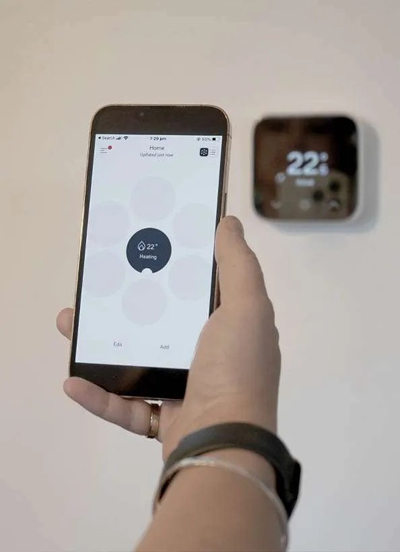As technology continues to evolve, so do the options available for managing your home’s heating system. One of the most significant advancements in recent years is the smart thermostat — which offers much more than just temperature control.
But what exactly sets a smart thermostat apart from a conventional one? And is it worth the upgrade? In this post, we’ll explore the key differences between smart and conventional thermostats and how upgrading to a smart thermostat can lead to greater comfort, energy efficiency, and cost savings.
What is a Smart Thermostat?
A smart thermostat is a Wi-Fi-enabled device that allows you to control your home’s heating system remotely via a smartphone app, tablet, or computer.
Unlike conventional thermostats, which require manual adjustments, smart thermostats offer advanced features like learning your schedule, adjusting temperatures automatically, and providing energy usage reports.
Key Differences Between Smart and Conventional Thermostats
Learning Capabilities
- Smart Thermostats: These devices can learn your habits over time, adjusting the temperature based on your daily routine. For example, if you typically leave for work at 8 a.m., the thermostat can automatically lower the temperature after you leave and raise it again before you return.
- Conventional Thermostats: Require manual adjustments or basic programming, with no learning capabilities. You set a fixed schedule and must change it manually if your routine changes.
Remote Control
- Smart Thermostats: Control your home’s temperature from anywhere using a smartphone app. This feature is particularly useful if you’re away from home and want to adjust the heating before you return or if you forgot to turn it down when you left.
- Conventional Thermostats: Must be adjusted manually at the device itself. There’s no option for remote control, limiting flexibility.
Energy Monitoring and Reporting
- Smart Thermostats: Provide detailed reports on your energy usage, helping you identify patterns and areas where you can save energy. Some models even offer tips for improving efficiency.
- Conventional Thermostats: Do not provide any insights into energy consumption, making it harder to track and optimize energy use.
Integration with Other Smart Home Devices
- Smart Thermostats: Often integrate with other smart home devices, such as smart lights, security systems, and voice assistants like Amazon Alexa or Google Assistant. This creates a seamless, automated home environment.
- Conventional Thermostats: Operate independently and cannot be integrated with other smart devices.
The Benefits of Upgrading to a Smart Thermostat
Energy Efficiency and Cost Savings
By learning your schedule and adjusting temperatures automatically, smart thermostats reduce energy waste. This can lead to significant cost savings on your energy bills, particularly during peak heating seasons.
Increased Comfort and Convenience
Smart thermostats allow you to maintain a comfortable home environment effortlessly. Whether it’s adjusting the temperature while you’re still in bed or ensuring your home is warm when you arrive from work, the convenience of remote control and automation cannot be overstated.
Environmental Impact
Reducing energy consumption not only saves you money but also lowers your carbon footprint. By using energy more efficiently, smart thermostats contribute to a more sustainable lifestyle.
Future-Proofing Your Home
As more homes become smart-enabled, upgrading to a smart thermostat can increase your property’s appeal to potential buyers, making it a wise investment for the future.
Is a Smart Thermostat Right for You?
While smart thermostats offer many benefits, they may not be necessary for everyone. Consider upgrading if:
- You want to reduce energy costs and improve efficiency.
- You value convenience and want to control your heating remotely.
- You’re planning to integrate more smart devices into your home.
If you’re still unsure, contact us for personalised advice. Our experts can help you assess your needs and find the perfect thermostat for your home
Conclusion
Smart thermostats are more than just a gadget—they’re a powerful tool for managing your home’s heating system with greater efficiency and ease. Whether you’re looking to save money, reduce your environmental impact, or simply enjoy the convenience of smart home technology, upgrading to a smart thermostat could be the right move.





